Rise of the museum Twitter bots
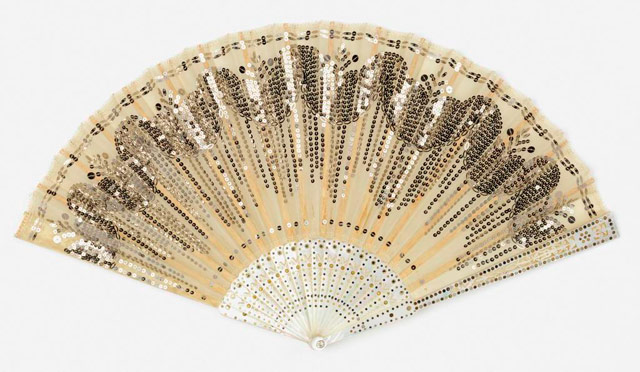
John Emerson has compiled a list of Twitter accounts that periodically tweet out images from the online collections of some of the world’s best museums, including the Met, the Tate, the Rijksmuseum, and MoMA.



This site is made possible by member support. 💞
Big thanks to Arcustech for hosting the site and offering amazing tech support.
When you buy through links on kottke.org, I may earn an affiliate commission. Thanks for supporting the site!
kottke.org. home of fine hypertext products since 1998.

John Emerson has compiled a list of Twitter accounts that periodically tweet out images from the online collections of some of the world’s best museums, including the Met, the Tate, the Rijksmuseum, and MoMA.
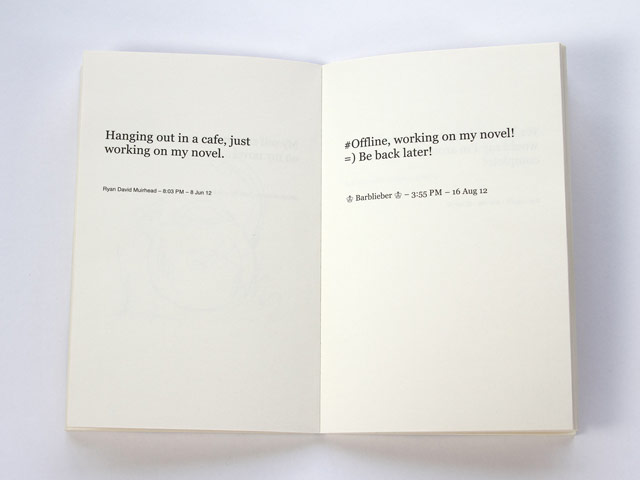
From artist Cory Arcangel, Working On My Novel is a book comprised of tweets from people who posted they were working on their novels.
What does it feel like to try and create something new? How is it possible to find a space for the demands of writing a novel in a world of instant communication? Working on My Novel is about the act of creation and the gap between the different ways we express ourselves today. Exploring the extremes of making art, from satisfaction and even euphoria to those days or nights when nothing will come, it’s the story of what it means to be a creative person, and why we keep on trying.
Arcangel also ran a blog that reposted “I’m sorry I haven’t posted” posts from other blogs.
Hi, everybody! Tim Carmody here, guest-hosting for Jason this week.
There are fewer third-party Twitter applications in active development than there used to be, since Twitter built its own clients, clamped down on apps that “replicate Twitter’s core user experience,” limited the number of new user tokens third parties could get, and otherwise kinda spiked the well.
But there are still some gems out there, including some I was surprised I’d never heard of. Joanna Geary, Twitter’s head of news in the UK, recently put together a shortlist of 30 third-party webapps useful for journalists. Here are three I’ve been using and enjoying:
Two other Twitter tools worth trying that aren’t part of Geary’s list but are worth a look:
I just started with Nuzzel, but it comes highly recommended by Christopher Mims and Lauren Goode, two reporters whose judgment I trust. Like Flipboard and Newsle and a handful of others, it pulls web links from your Twitter and Facebook feeds, sorting them by the most-shared. A good way to see what everybody’s talking about at a glance.
And Happy Friends is a mailbox/outline reader for Twitter that’s hard to explain but fun to use once you get into it. It’s not like anything else out there, which might be the best compliment I can give it.
Update: I missed an app that I’ve been using for so long and so often that I forgot to mention it. ThinkUp, which offers “analytics for humans.” The best thing about ThinkUp are its email “insights” digests, which tell me things like which users I’m talking to most often, whether I’m retweeting too many of my own replies (hint: when I asked you what you name your computers yesterday, I retweeted probably a few too many of your answers), and other little mini-analyses.
I also have to put in a plug for YoruFukurou, my favorite client for Mac. (I hope your tokens don’t run out, YF.) It’s a customizable, high-powered app that handles lists and spam reporting and link and image expansion well, but it doesn’t have that oh-my-god, Ozymandias-watching-30-TV-screens-at-once thing that TweetDeck has. An elegant weapon for a more civilized age.
The Guardian has an interview with Adam Parrish, creator of @everyword, an automated Twitter account that’s been listing a dictionary’s worth of English words in sequence since 2007. @everyword recently reached the Zs and will complete and close tomorrow, June 6.
Words aren’t just things that we write and use in our speech. They are also things we think about individually. Like sex, weed, swag - when they’re not in a sentence, we can also think about them individually. Everyword raises that question of thinking about a word just from that perspective, as a social object.
On the other hand, because @everyword is inside an individual person’s Twitter stream, the words take on the context of whatever else is in the stream at the time. There’s the possibility of weird serendipitous interactions between a word in your stream and some other tweets. The word “super” might be tweeted, and then you read a tweet about a school superintendent or Superman movie.
Any Twitter account that gets you thinking about both the Platonist and the Dadaist dimensions of language at the same time is my kind of fun. And that’s a sort of fun that I associate with the Golden Age of Twitter, given its commingling of high and low, news and musings, humans and bots. That too is coming to a close:
In its early days, because of ven-cap funding, Twitter wasn’t thinking about monetization. They were just really encouraging developers to work with it and do interesting things. There was no concept of ads or promoted tweets. Now things are different. They’ve changed the API and some of the things that were easy to do are now difficult.
The flipside is, more people use it. As an artist, it’s disappointing that the medium has been converted into this very commercial, focused platform, but on the other hand I get to have a huge audience for an experimental writing project. It’s a huge privilege and I definitely have Twitter to thank for that.
It’s all cause for low-grade melancholy and a touch of anxiety. As Suzanne Fischer wryly tweets: “If the dictionary is finite, what else might be ending?”
From Rap Genius, a chart showing mentions in rap songs of popular social sites and apps like Twitter and Instagram:
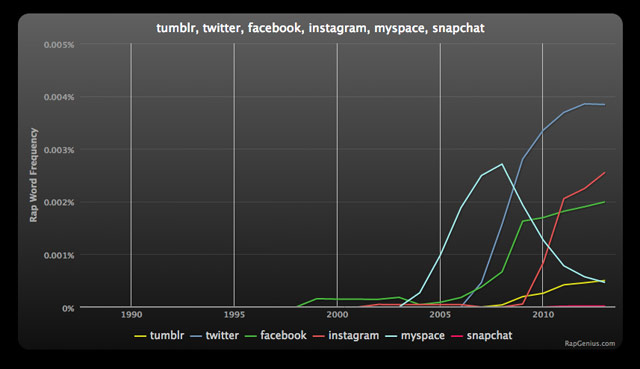
Compare with the graph for the same terms from Google News:
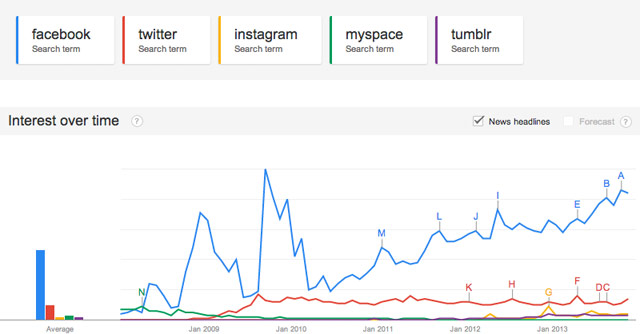
And here’s the graph for general search terms. (I excluded Snapchat from the Google graphs because Google wouldn’t allow 6 search terms at a time…it barely showed up in either case.) Twitter rules the rap roost, but Facebook demolishes everyone in general and news search traffic.
For this week’s New Yorker, D.T. Max has written a profile of Twitter co-founder Jack Dorsey.
Jack Dorsey, the tech entrepreneur, takes the No. 1 bus to work, and he likes to catch the 7:06. It carries him nearly from one side of San Francisco to the other-down California Street almost to Market. A ride costs two dollars, but Dorsey has a monthly pass, so the actual price, he told me on a recent commute, is closer to a dollar seventy-five. “If you buy it in bulk, it saves you a little bit of money,” he explained. As we got on, he added, “I love the bus. It’s consistent, and it runs every few minutes. But it’s also express. If I took another bus, it’d be stopping.” The offices of Square, his mobile payment-processing service, just moved. He used to follow his bus ride with a pleasant twenty-minute walk down Mission to the San Francisco Chronicle Building, where Square rented office space; now his commute ends with a short ride on a Muni train to Square’s new headquarters, which have a panoramic view of the city. When we got to the Muni stop, Dorsey, who is thirty-six, pointed it out with the excitement of a six-year-old.
No idea if this was intentional, but Max has managed to write a piece that mirrors Twitter itself: it is both substantial and full of ridiculous things.
The latest installment of XKCD’s What If? column starts off by answering a question about how tall your Twitter timeline would be if it extended off the screen.
On my computer’s monitor, the average tweet is about 2.4 centimeters high. This suggests that Jeph Jacques’ tweet tower is 900 meters tall-taller than the tallest building-and still growing.
However, Jeph has nothing on @YOUGAKUDAN_00, who tweets many times per minute — usually binary, but sometimes actual words. @YOUGAKUDAN_00 has accumulated 37 million tweets, enough to reach into low Earth orbit.
But then a more interesting question is explored…how long will Twitter last?
Suppose you’re transported to an alternate universe. You open IMDb and load a random page, and the movie that comes up is The Land Before Time XXVII.
Based only on the title, how many Land Before Time movies do you think there are in this universe? Clearly there are at least 27, and probably more.
Allied troops faced a version of this problem in World War II. German tank parts had serial numbers, many of which were sequential (1, 2 … N). Suppose they captured a random tank. If they determined it was Tank #27, then they can be sure that the Germans had made at least 27 tanks. It also told them there probably weren’t millions of tanks; if there were, they would have been unlikely to get a two-digit serial number.
Sesame Street did a series of tweets the other day in the style of The Monster at the End of This Book, which is a favorite of mine and my kids.
Grover: That tweet, did it say there was a MONSTER at the end of it?
Grover: It did? Well, please do not retweet that tweet!
Grover: YOU RETWEETED THE TWEET!
Eric Schmidt, the former CEO and current Executive Chairman of Google, recently visited North Korea and took his daughter Sophie along. Upon her return, she wrote up a very interesting account of her trip. Her report contained a surprising number of Twitter-length nuggets of goodness1; here are some of them:
Our trip was a mixture of highly staged encounters, tightly-orchestrated viewings and what seemed like genuine human moments.
The longer I think about what we saw and heard, the less sure I am about what any of it actually meant.
Nothing I’d read or heard beforehand really prepared me for what we saw.
Most of the buildings they visited — offices, libraries, etc. — were not heated:
They’re proudly showing you their latest technology or best library, and you can see your breath
They weren’t allowed to have mobile phones, there were no alarm clocks, and they were told their rooms were probably bugged:
One person suggested announcing “I’m awake” to the room, and then waiting until someone came to fetch you.
It’s like The Truman Show, at country scale.
Very little in North Korea, it seemed to us, was built to be inviting.
You could almost forget you were in North Korea in this city, until you noticed little things, like the lack of commercial storefronts.
There is only revolutionary art. There is only revolutionary music.
I was delighted to learn that [Kim Jong Il] and I shared a taste in laptops: 15” Macbook Pro.
No one was actually doing anything.
They’re building products for a market that doesn’t exist.
It’s a fascinating piece and worth putting up with the weird 2-column layout to read the whole thing.
[1] In fact, almost every sentence is tweet-length. Do young people naturally write in SMS/tweet-length sentences these days? ↩
A nice post from Anil Dash about the web of yesteryear and all the nice things we used to have.
When you see interesting data mash-ups today, they are often still using Flickr photos because Instagram’s meager metadata sucks, and the app is only reluctantly on the web at all. We get excuses about why we can’t search for old tweets or our own relevant Facebook content, though we got more comprehensive results from a Technorati search that was cobbled together on the feeble software platforms of its era. We get bullshit turf battles like Tumblr not being able to find your Twitter friends or Facebook not letting Instagram photos show up on Twitter because of giant companies pursuing their agendas instead of collaborating in a way that would serve users. And we get a generation of entrepreneurs encouraged to make more narrow-minded, web-hostile products like these because it continues to make a small number of wealthy people even more wealthy, instead of letting lots of people build innovative new opportunities for themselves on top of the web itself.
The open web is an amazing thing, way way way better than Facebook, Twitter, Tumblr, Instagram, Pinterest, and all the apps on my phone put together. The thing that really irritates me and deeply disappoints me about Twitter specifically is that the people who started that company and those who now run it know this. They know exactly what Anil is talking about. They railed against big companies trying to control the web back in the day. And they don’t care anymore? Are they just out for themselves and the money? Has the Valley really shifted so significantly from Brand to Rand?
Matt Haughey wrote an essay called Why I love Twitter and barely tolerate Facebook.
There’s no memory at Twitter: everything is fleeting. Though that concept may seem daunting to some (archivists, I feel your pain), it also means the content in my feed is an endless stream of new information, either comments on what is happening right now or thoughts about the future. One of the reasons I loved the Internet when I first discovered it in the mid-1990s was that it was a clean slate, a place that welcomed all regardless of your past as you wrote your new life story; where you’d only be judged on your words and your art and your photos going forward.
Facebook is mired in the past.
One of my favorite posts on street photographer Scott Schuman’s blog, The Sartorialist, consists of two photos of the same woman taken several months apart.

Schuman asked the woman how she was able to create such a dramatic change:
Actually the line that I think was the most telling but that she said like a throw-away qualifier was “I didn’t know anyone in New York when I moved here…”
I think that is such a huge factor. To move to a city where you are not afraid to try something new because all the people that labeled who THEY think you are (parents, childhood friends) are not their to say “that’s not you” or “you’ve changed”. Well, maybe that person didn’t change but finally became who they really are. I totally relate to this as a fellow Midwesterner even though my changes were not as quick or as dramatic.
I bet if you ask most people what keeps them from being who they really want to be (at least stylistically or maybe even more), the answer would not be money but the fear of peer pressure — fear of embarrassing themselves in front of a group of people that they might not actually even like anyway.
For a certain type of person, changing oneself might be one of the best ways of feeling free and in control of one’s own destiny. And in the social media world, Twitter feels like continually moving to NYC without knowing anyone whereas Facebook feels like you’re living in your hometown and hanging with everyone you went to high school with. Twitter’s we’re-all-here-in-the-moment thing that Matt talks about is what makes it possible for people to continually reinvent themselves on Twitter. You don’t have any of that Facebook baggage, the peer pressure from a lifetime of friends, holding you back. You are who your last dozen tweets say you are. And what a feeling of freedom that is.
I wondered how long it would be before someone connected Facebook and especially Twitter with the idea of extractive and inclusive economic systems forwarded by Daron Acemoglu and James Robinson in Why Nations Fail. The winner, in a delightfully over-the-top fashion, is David Heinemeier Hansson from 37signals.
Twitter started out life as a wonderfully inclusive society. There were very few rules and the ones there were the people loved. Thou shall be brief, retweet to respect. Under this constrained freedom, Twitter prospered and grew rapidly for the joy of all.
Budding entrepreneurs built apps that made life better for everyone. Better, in fact, than many of Twitter’s own attempts. They competed for attention on a level playing field and the very best rose to the top. Users saw that this was good and rewarded Twitter with their attention. Twitter grew.
Unfortunately this inclusive world was not meant to last. From the beginning, an extractive time bomb was ticking. One billion dollars worth of eagerness for return. Hundreds and hundreds of hungry mouths to feed in a San Francisco lair.
And thus began Twitter’s descent into the extractive.
Chrystia Freeland provided the gist of the book in a NY Times essay earlier in the fall:
Extractive states are controlled by ruling elites whose objective is to extract as much wealth as they can from the rest of society. Inclusive states give everyone access to economic opportunity; often, greater inclusiveness creates more prosperity, which creates an incentive for ever greater inclusiveness.
Newsweek announced yesterday that the print magazine will cease publication and the entire thing will move to an all-digital format.
Newsweek Global, as the all-digital publication will be named, will be a single, worldwide edition targeted for a highly mobile, opinion-leading audience who want to learn about world events in a sophisticated context. Newsweek Global will be supported by paid subscription and will be available through e-readers for both tablet and the Web, with select content available on The Daily Beast.
In talking about the shift on his Daily Beast blog, Andrew Sullivan notes something interesting about reading online vs. reading in print (emphasis mine):
Which is why, when asked my opinion at Newsweek about print and digital, I urged taking the plunge as quickly as possible. Look: I chose digital over print 12 years ago, when I shifted my writing gradually online, with this blog and now blogazine. Of course a weekly newsmagazine on paper seems nuts to me. But it takes guts to actually make the change. An individual can, overnight. An institution is far more cumbersome. Which is why, I believe, institutional brands will still be at a disadvantage online compared with personal ones. There’s a reason why Drudge Report and the Huffington Post are named after human beings. It’s because when we read online, we migrate to read people, not institutions. Social media has only accelerated this development, as everyone with a Facebook page now has a mini-blog, and articles or posts or memes are sent by email or through social networks or Twitter.
People do tend to read people and not institutions online but a shift away from that has already started happening. A shift back to institutions, actually. Pre-1990s, people read the Times or Newsweek or Time or whatever. In 2008, people read Andrew Sullivan’s Daily Dish or Paul Krugman’s column in the Times or Gwyneth Paltrow’s GOOP. Today, people read feeds of their friends/followees activities, interests, thoughts, and links on sites like Twitter, Facebook, Pinterest, and Tumblr, i.e. the new media institutions.
Now, you may follow Daily Dish or Krugman on Twitter but that’s not quite the same as reading the sites; you’re not getting the whole post/article on Twitter, Krugman items are intermingled & fighting for attention with tweets from @horse_ebooks & Lady Gaga, and if you unfollowed Krugman altogether, you’ll find when he writes something especially good, someone else in your Twitter stream will point you to it pretty quickly. That is, Twitter or Facebook will provide you with the essential Krugman without you having to pay any attention to Krugman at all.
What that means is what blogs and the web are doing to newspapers and magazines, so might Facebook & Twitter do to blogs. Blogs might not even get the chance to be called old media before they’re handed their hats. It’ll be interesting to see how smartphone/tablet apps affect this dynamic…will apps push users/readers back toward old media institutions, individuals, or the friend-packaging institutions like Twitter?
According to the data scientists at Stellar (i.e. me armed with clumsy SQL queries), people like riffing off of Jay-Z’s line from 2004’s 99 Problems:
If you’re having girl problems I feel bad for you, son
I’ve got 99 problems, but a bitch ain’t one
Here are some of the better ones I found:
@antichrista: If you got religious circumcision, I feel bad for you, son. I got 99 problems but a bris ain’t one.
@elibraden: I’m rubbing lotion on my belly rapping “I got 99 problems but ab itch ain’t one” to the elderly men in the gym locker room.
@goldengateblond: “I got 99 problems but the witch ain’t one.” — Darrin Stevens, widower
@evacide: I’ve got 99 problems, but an insufficiently sophisticated grasp of 4th amendment law ain’t one: https://t.co/E2XcSpb8
@dustmop: I got 99 problems but one of them is that i used hex and i actually have 152 other problems :(
@sween: If you’re coming to Canada to escape Obamacare, I feel bad for you son. We’ve got 99 problems but a lack of socialized medicine ain’t one.
@bagyants: “I got 99 problems, but they can wait.” - Lay-Z
@mikesacco: i got 99 problems but that’s 693 in dog problems!!
@blitznbeans: “I got 99 problems but I really need to lie back on this chair.” - Chaise-Z
@justin: I’ve got 99 problems but a view controller that works as expected on iOS 5 and doesn’t respond to user interaction on iOS 4 is the main one.
@paulypeligroso: “I got 99 problems but a bitch aint one.” - The Dalmatian parents from 101 Dalmatians.
@trevso_electric: I got 99 problems but white privilege ensures that they’re relatively trivial or easily worked out with a therapist.
@yellowcardigan: I got 99 problems but a joke structure based on a 2004 rap single ain’t one.
@lisarahmat: I got 99 problems but my math ain’t one hundred.
Let’s get a Kickstarter together to have Jay-Z rap all these lines.
Edd Dumbill writes that Twitter, as it strives to become a profitable company, is turning into an old media company.
Twitter’s bait-and-switch, now they’ve built their reach on the back of eager early adopters, is disappointing. It marks them as part of old, unenlightened, business, and consigns them to a far less remarkable place in the future economy than they otherwise might have had.
Michael Heilemann has a somewhat harsher take in his post on Amazon, Twitter, and Star Wars:
Some part of me can’t help but admire the purity of the clusterfuck that is Twitter’s continued downward trajectory from startup wunderkind to some sort of bland, wannabe ad-driven media company.
It’s incomplete, but I can’t help but draw comparisons between Twitter’s alienation of their original users and ecosystem to, because I am me, Star Wars.
Despite what George Lucas says, the continuing alterations to Star Wars have been driven by business reasoning, not some artistic auteur need to see the vision completed. And in both cases, the original fan base is the one getting run over, while the unwashed masses get to enjoy Jar Jar and Justin Bieber, respectively.
Earlier today I shared a quick way to read a links-only version of your Twitter stream using Twitter’s new “people you follow” search filter. More than three years ago, Twitter removed @replies to people you don’t follow from people’s streams… e.g. if I follow Jack Dorsey on Twitter and you don’t, you won’t see my “@jack That’s great, congrats!” tweet in your stream. With the “people you follow” search filter, you now have the option of seeing all those @replies again: just do a search for some gibberish with the not operator in front of it. (But obviously not that gibberish because then you’ll miss tweets with that link in it. Get yer own gibberish!)
Two things that I wished worked that don’t: -@ and -# for searches that exclude @replies and #hastags.
Update: Andy Baio reminds me that you can filter out @replies and #hashtags with “-filter:replies” and “-filter:hashtags”. Which makes things a bit more interesting. Using the “people you follow” filter in combination with other filters, you can see your Twitter stream in all sorts of different ways:
- Only links
- Only links excluding Foursquare, Instagram, or whatever…
- Without links
- Without links and @replies (which is kind of an amazingly old school way to read Twitter)
You can also use it to read your stream with certain terms excluded…say if you didn’t want to read anything about the Presidential candidates, SXSW, Rupert Murdoch, the Yankees, or Gawker. I know other tools let you filter tweets in your stream in different ways, but this is the first time Twitter allows people to do it on their site, even if it is through the back door.
A few weeks ago, Twitter added an option to search the tweets of only the people you follow. This is useful for several different reasons (try searching for [recent pop culture key phrase] to see what I mean) but for those who use Twitter primarily to find cool links to read/watch, it’s an unexpected gift. To view your Twitter stream filtered to include only tweets containing links, just do a search for “http”. Simple but powerful.
ps. Who knows if they’re interested in this or not, but by a) making their entire archive available to search and b) allowing people to limit their search to their friends + 1-2 degrees of separation, Twitter could significantly better the search experience offered by Google et al in maybe 25-30% of all search cases. This is what Google is attempting to do with Google+ but Twitter could beat them to the punch.
Update: The search above, while quick, is also dirty in that it will include non-link tweets like “My favorite protocol is HTTP”. The official Twitter way to is to use “filter:links”, which will avoid that problem.
You can also filter out the links from your Twitter stream by negating the http search (this no longer works…), but you’ll have to wade through all the @replies.
Evan Henshaw digs through some ancient tweets to find the first usage of the now-ubiquitous @reply on Twitter.
The @reply was created on Thanksgiving day, November 23rd, 2006. One wonders if this was the first case of geeks using twitter to avoid their family on thanksgiving.
See also the first use of hashtags on Twitter. It’s funny that so many of the things that make Twitter compelling weren’t actually invented by Twitter but by the users and developers.
Update: Garrett Murray finds an even earlier usage.
Twitter has developed something called the Innovator’s Patent Agreement, which is an agreement between the company and its employees that their patents won’t be used in offensive lawsuits (as opposed to defensive lawsuits).
The IPA is a new way to do patent assignment that keeps control in the hands of engineers and designers. It is a commitment from Twitter to our employees that patents can only be used for defensive purposes. We will not use the patents from employees’ inventions in offensive litigation without their permission. What’s more, this control flows with the patents, so if we sold them to others, they could only use them as the inventor intended.
This is a significant departure from the current state of affairs in the industry. Typically, engineers and designers sign an agreement with their company that irrevocably gives that company any patents filed related to the employee’s work. The company then has control over the patents and can use them however they want, which may include selling them to others who can also use them however they want. With the IPA, employees can be assured that their patents will be used only as a shield rather than as a weapon.
Red Hat has had a similar policy in place for many years.
Loren Brichter invented the “pull to refresh” interface mechanism for Tweetie, a Twitter app he eventually sold to Twitter. Apparently he patented the idea sometime before the sale, so Twitter now owns the patent.
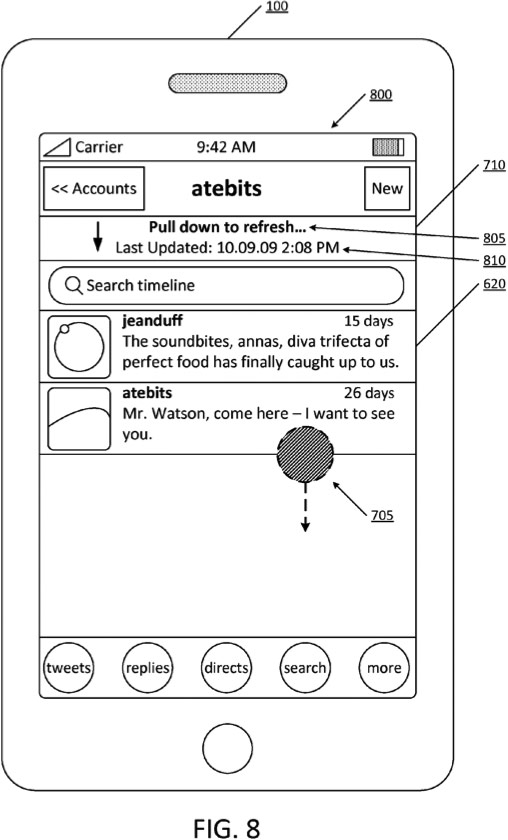
Paul Haddad of Tapbot says that Twitter won’t enforce the patent but, gosh, where have we heard that before?
Update: A reader pointed out that this is not a patent…it’s a patent application that hasn’t even been reviewed yet. But it’s clearly a novel invention and most likely will be accepted when reviewed. (thx, mike)
Chirp Clock finds tweets containing the current time and displays them on the site.
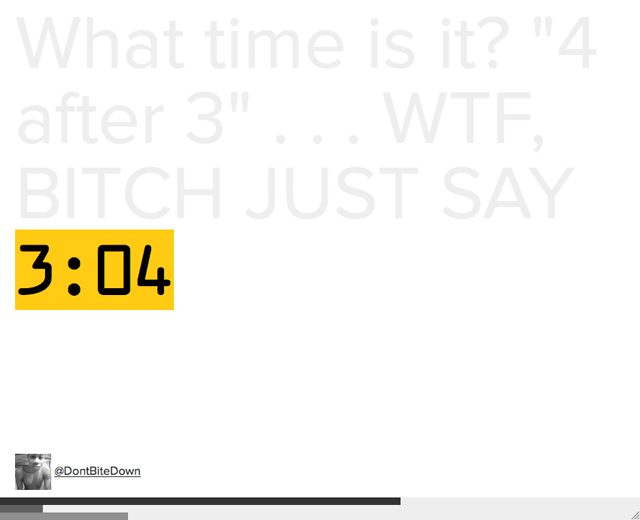
Nearly every second, a user on Twitter tweets about what time it is. It could be groaning about waking up, to telling a friend when to meet, to an automated train scheduler altering when the next one is coming. By searching Twitter for the current time we get a tiny glimpse of how active and far reaching the social network is.
See also The Clock by Christian Marclay. (via @noahkalina)
Some good thoughts about the new version of Twitter from Dan Frommer.
This is the beginning of Jack Dorsey’s real vision for Twitter combined with Dick Costolo’s vision for a real-time social advertising product. The main components: writing and Tweets, obviously; having conversations with other people; discovering what’s happening in the world through Twitter; and seeing a promoted message from brands here and there.
Over the past two days, I’ve seen this clever riff on the “give a man a fish” parable pop up over and over again on various social sites, primarily Twitter and Stellar:
Give a man a gun and he can rob a bank. Give a man a bank and he can rob the world.
The earliest instance of this text I could find on Twitter was posted by @Bonoboism on Nov 28. Because it was an @reply, the original post was not widely retweeted but over the next day or so, it was posted by dozens of other people without attribution and some of those knock-off posts got hundreds and even thousands of retweets. Without looking too hard, I found tweets by @ilegal, @MrsSelfDestrukt, @owenderby, @sickipediabot, @HipstaGangsta, @ladydebidebz, @tickly, and @yourrhighness_. Tweets like this have a tendency to get appropriated by others without attribution…the temptation to appear that pithy is just too great, I guess.
The @RealTimeWWII Twitter account is tweeting the events of World War II as they happened 72 years ago. A sample tweet from a few hours ago:
Germany has announced (again) that it will respect the neutrality of Belgium & Holland; “No German troops will enter the Low Countries”
Meanwhile back in 1668, Samuel Pepys is having trouble with his wife because he had a dalliance with the maid.
To dinner. The girle with us, but my wife troubled thereat to see her, and do tell me so, which troubles me, for I love the girle.
Ha! Evan Roth is selling a series of “multi-touch finger paintings” called Open Twitter, Check Twitter, Close Twitter. The paintings are made by placing tracing paper over an iPhone screen while he checks Twitter with a painted finger.
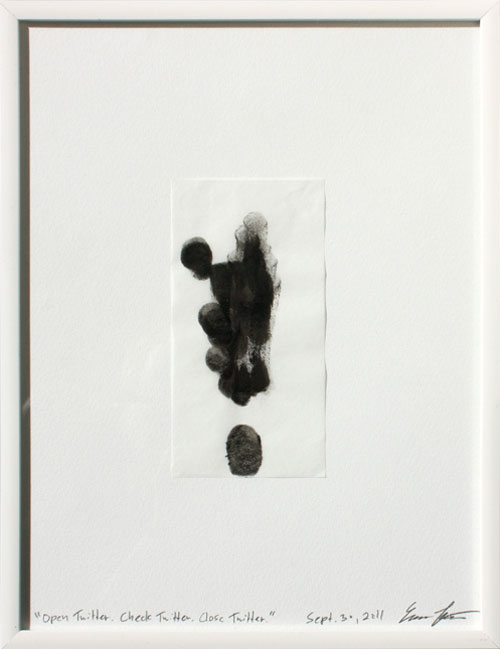
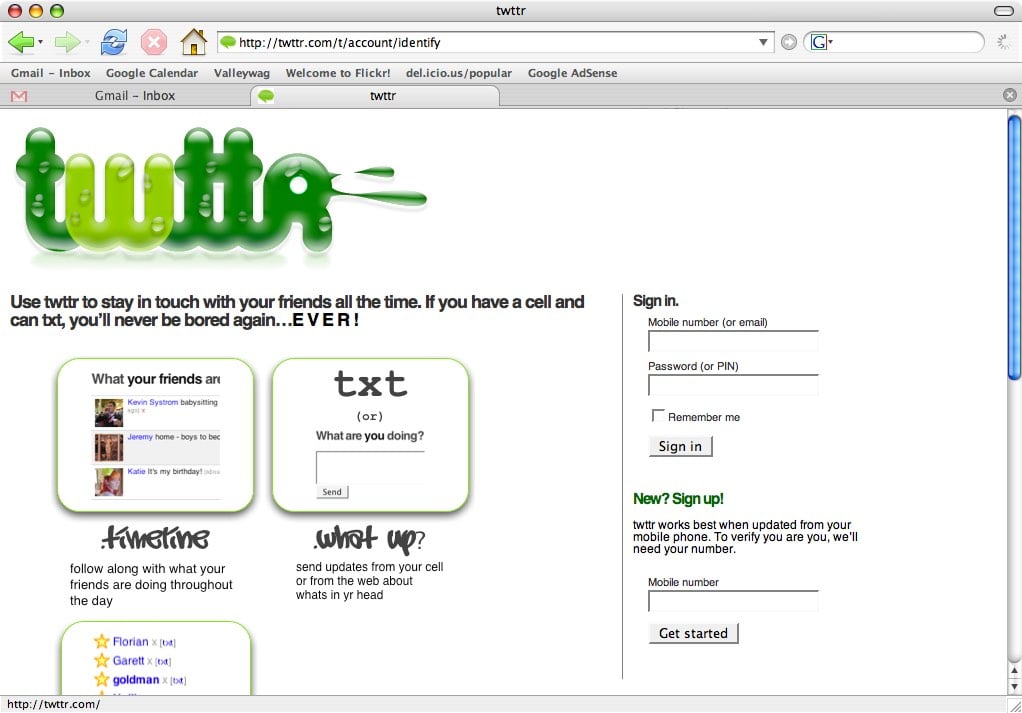
Or at least a very early version. From humble beginnings…
ps. Here’s an early Facebook screenshot, an early Google homepage, and Yahoo’s homepage circa 1994, and an early screencap of Tumblr’s dashboard.
Update: If you look at the screenshot closely, there’s a familiar name at the top of the “What your friends…” box: Instagram co-founder Kevin Systrom (his Twitter user id is 380…meaning that he was one of the first 400 people to sign up for the service).
Whoa, I think Shaquille O’Neal just announced his retirement on Twitter:
im retiring Video: http://bit.ly/kvLtE3 #ShaqRetires
A look back at the Magic (and Lakers and Celtics and Cavs and Heat and Suns and Fighting Tigers):
I’ve been seeing a few mini bar charts (aka sparklines) pop up on Twitter in the past few days. Like this one:
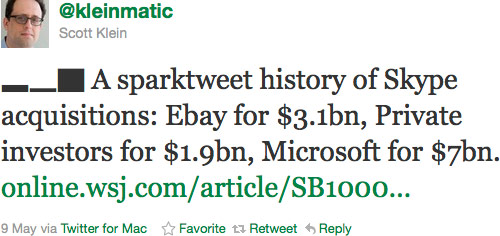
Last year Alex Kerin built an Excel-to-Twitter sparkline generator that uses Unicode block elements for the tiny charts and now media outlets like the WSJ are using it to publish data to Twitter:
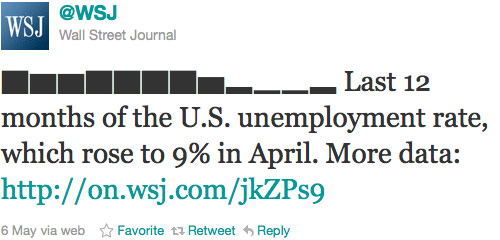
Anil Dash has a nice post on how the WSJ came to use Kerin’s idea. Here are a few more favorites “sparktweets” (1, 2, 3, 4, 5):

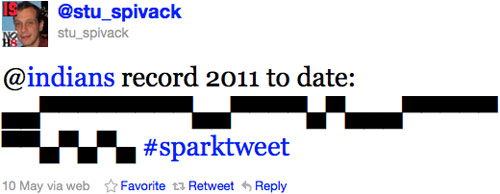
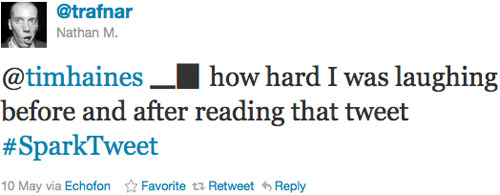
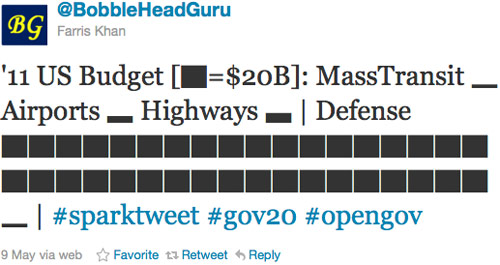

At least two popular quotations circulating on Twitter and Facebook in the wake of the killing of Osama bin Laden are misattributed. By what I guess is chance, they happen to express opposing (but nuanced and appealing) sentiments:
“I mourn the loss of thousands of precious lives, but I will not rejoice in the death of one, not even an enemy.” -
Martin Luther King, Jr“I’ve never wished a man dead, but I have read some obituaries with great pleasure.” -
Mark Twain
The Fake Mark Twain quote has a pretty straightforward story. It’s a slightly altered version of a quote by lawyer/orator/evolution & civil rights hero Clarence Darrow:
All men have an emotion to kill; when they strongly dislike some one they involuntarily wish he was dead. I have never killed any one, but I have read some obituary notices with great satisfaction.
(Note: That’s from Darrow’s autobiography, The Story of My Life. Wired’s story above linked to Wikiquote, so I thought I’d pull it from Google Books at least.)
Darrow is still pretty famous, but not Mark Twain famous. And especially in the truncated version, the quip sounds like the sort of thing that Mark Twain might say.
Easy mistake - and when the line fits how we might feel at a given moment, and the author fits our moral/intellectual identity, it becomes a natural quote to pass around.
The story behind the Fake Martin Luther King quote is a little bit more complicated. Megan McCardle was the first to flag it as suspect. Then people began to notice that while the version above was making the rounds on Twitter, a longer version on Facebook paired it with an extended quote that was genuine MLK:
“
I will mourn the loss of thousands of precious lives, but I will not rejoice in the death of one, not even an enemy.Returning hate for hate multiplies hate, adding deeper darkness to a night devoid of stars. Darkness cannot drive out darkness: only light can do that. Hate cannot drive out hate: only love can do that.” ~Martin Luther King Jr
The real quote (beginning with “Returning hate for hate”) is from MLK’s book of sermons Strength to Love.
And the context really is about why you have to love your enemy. In the same book, too, is an essay called “The death of evil upon the seashore,” which has this not totally unrelated quote about the escape of the Israelites from Egypt by crossing the Red Sea:
The meaning of this story is not found in the drowning of the Egyptian soldiers, for no one should rejoice at the death or defeat of a human being. Rather, this story symbolizes the death of evil and of inhuman oppression and unjust exploitation.
So, again, it’s the kind of thing that sounds like something Martin Luther King, Jr might say — even though he didn’t say it.
At some point, someone deduced what must have happened. The real King quote (about returning hate for hate) must have gotten paired with the King-esque quote/paraphrase (about not rejoicing in the death of an enemy). Somewhere in circulating on Facebook, the whole thing got attributed to King, then jumped to Twitter, where the first line got separated from the genuine quote, re-attributed to King, then passed around from there.
It turns out that this is exactly what happened. The actual source of the quote (with the screenshot to prove it) is actually Jessica Dovey.
This is where it gets a little confusing. Salon’s Drew Grant thought she had tracked the misquote’s jump to Twitter to magician/author Penn Jillette. Grant wrote a story about how Jillette had made up the quote, possibly as a deliberate prank.
Grant said Jillette had admitted to inventing the quote. But Jillette’s Twitter apology doesn’t really seem to say that:
I checked a long quote from MLK’s “Strength to love”1963 that spoke to some of my feelings, then I cut and pasted an altered hunk. Sorry.
Jillette’s actually disclaiming authorship here - he says he “cut and pasted” it. But people are still arguing that he’s claiming credit and complaining that he won’t comment.
One of the many things that fascinated Freud about jokes was that they passed around from person to person without an author. This is why they were interesting - they showed the unconscious uncensored, in public. (This is a big part of what Wit and its Relation to the Unconscious is about.)
When we (mis)attribute a joke or quote, we’re doing something different: we’re giving our unconscious an author, and leaning on the author’s authority. Just like with jokes, it’s an acceptable way to let our nervous feelings out, without having to completely own them ourselves. We just co-sign.
In the spirit of Freud, here are some of the best MLK-misquote jokes currently going around on Twitter (with anonymity of the jokesters preserved):
“You dummies will retweet anything with my name.” - Martin Luther King, Jr.
There is a Martin Luther King Jr. cookie recipe making its way around the web! It does not taste good. DO NOT MAKE IT.
“Dr. Martin Luther King Jr. will have some good ideas.” - Theodore Roosevelt
“War is a giant dishwasher full of tiny elephants but the soap is motor oil and the dishes are pee” -Martin Luther King, Jr
“Scrambled eggs, side of home fries, and a light and sweet coffee, thanks.” —Martin Luther King Jr. (in a diner)
“Luke. I am your father.” - Martin Luther King, Jr.
(Actually, Penn Jillette wrote all of these jokes. That guy’s amazing.)
Update: Ivan Cavero Belaunde may have identified the source of the Twain/Darrow misquote — a 2006 blog post with Darrow’s quote next to another on the same theme by Twain:
Clarence Darrow
I have never killed a man, but I have read many obituaries with great pleasure.
Mark Twain
I didn’t attend the funeral, but I sent a nice letter saying I approved of it.
Ivan adds that “that link was until yesterday the #1 Google result for the phrase ‘I have read some obituaries with great pleasure’.”
So odds are pretty good that someone half-remembered the Darrow quote, did a quick Google search for attribution, saw the result with Twain’s name at the end, and went for it (maybe without even clicking through).
Business Insider has a pair of articles about what they say is the real story about the founding of Twitter. The first is a general outline of the unofficial history of the company versus what you generally hear from the company and its founders.
Glass insists that he is not Twitter’s sole founder or anything like it. But he feels betrayed that his role has basically been expunged from Twitter history. He says Florian Webber doesn’t get enough credit, either.
“Some people have gotten credit, some people haven’t. The reality is it was a group effort. I didn’t create Twitter on my own. It came out of conversations.”
“I do know that without me, Twitter wouldn’t exist. In a huge way.”
The second is an interview with Noah Glass, who many people who were there at the beginning of the service consider one of the true cofounders of Twitter.
Jack [Dorsey] was someone who was one of the stars of the company and I got the impression he was unhappy with what he was working on. He was doing a lot of cleanup work on Odeo. He and I had become pretty close friends and were spending time together.
He started talking to me about this idea of status and how he was really interested in status. He developed this bicycle messenger status system in the past. I was trying to figure out what it was he found compelling about it. At the same time, we were looking at ‘groups’ models and how groups were formed and put a couple things together to look at this idea of status and to look at this idea of grouping and it sort of hit me - the idea for this product. This thing that would be called Twitter, what it would look like. This ad hoc grouping mechanism with non-realtime status updates all based on mobile phones.
There was a moment when I was sitting with Jack and I said, “Oh, I do see how this could really come together to make something really compelling.” We were sitting on Mission St. in the car in the rain. We were going out and I was dropping him off and having this conversation. There was a moment where it all fit together for me.
We went back to Odeo and put together a team. A very separate working team, mostly it was myself, Jack, and Florian [Webber], a contractor. [Florian] was working from Germany at the time.
See also Trouble @Twitter. (via @anildash)
Stay Connected